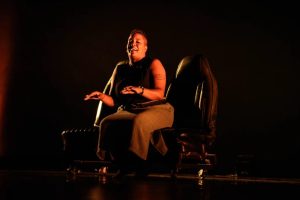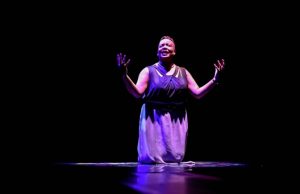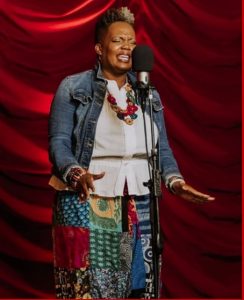
Manón Voice – Courtesy of Manón Voice. Used with permission.
Storytelling Arts of Indiana celebrates Women’s History Month with two accomplished storytellers showcasing their diverse heritages. Indianapolis Arts Council has already named “Bold Lineage” a top pick for cultural entertainment. Minton Sparks and Indianapolis’own Manón Voice will deliver stories, music, poetry and spoken-word artistry, Saturday, March 19 at 7 p.m. at the Indiana History Center.
Etheridge Knight wrote the 42-line poem “The Idea of Ancestry” in 1968. The title signifies the subject of the poem — the poet’s connection to his family, birthplace, and culture. Using this title and context for inspiration, poet and spoken-word artist, Manón Voice, will weave a narrative through storytelling and spoken word that celebrates and pays homage to the bold lineage of Black women writers and the many mothers who shaped her as a poet, writer, and woman.
Recently, I had an opportunity to chat with the artist (her last name, Voice, is a stage name) about her background and passion for storytelling. Below is an edited transcript of our conversation.
When did you begin storytelling?
I started writing in grade school, at seven or eight years old. I picked up a book of poetry. I was inspired by the power of words, really, early on. I remember reading my first poem and really feeling transported to a different world, and so I kept writing through grade school, middle school and high school. I was kind of a closet writer. It was not something I came out with, as far as to a lot of family or friends. I would sort of write things and put them away. Then, when I was in college at I.U., I experienced for the first time in my life, a spoken-word poet. I didn’t know it was possible to perform poetry. I thought poetry was something that was just written. But this poet had brought poetry alive and embodied it. In a way, for me, that turned on a light and I thought, “Oh, my gosh. This is fascinating. I’ve never seen this done before.” So, I had a friend who challenged me to take some of the poetry I had written and bring it on stage and I said, “No, I’m not the kind of poet who performs. I am just the kind of poet who writes.” But she kept challenging me and so I tried it out. This was over 15 years ago. I just started doing it more and more, making my way at open mics around the city. So, I have been doing it now, gee, I have probably been on the Indianapolis scene for about 12 or 13 years. I have been a full- time artist for two years. So, I have been really blessed to see the arc of it grow and evolve into a vocation.
Are you making a living at it?
I am managing to make a living, which I am very thankful for. I tell people “I am a Black woman poet living in the city of Indianapolis, making a living.” (laughs) Those are three factors which can kind of diminish that possibility, but I think it says a lot about how our city has grown, the arts and culture in our city and just the power of perseverance and stepping out on stage and being committed to doing what you love.
Who are you influences generally and then as an artist?
There is a lot of overlap there. So, one of the first voices I heard was the late Maya Angelou. I encountered her poem as a young Black girl. She was the first Black woman poet whom I came across and her boldness, her charisma, and the power of her voice and words was just incredible. It made an incredible impression upon my psyche at that time. So, I always credit Dr. Angelou as being my first influence when it comes to poetry. Most of the people who have influenced me have been Black women. I have my vocational ancestry, people like Maya Angelou, and people like Gwendolyn Brooks, Nikki Giovanni, who is another poet, Toni Morrison, Audre Lorde, and Mari Evans.
Don’t you love the mural of her on the side of a building on Mass Ave?
Yes, I absolutely love it and I am so glad because she was this towering figure.

Manón Voice Courtesy of Manón Voice. Used with permission.
That pink suit she is wearing just pops, right?
Yes, I get around that neighborhood all the time, so it is great to always see her. I would not be able to have the career I have without her having blazed a trail.
Did you know her?
I did not have the chance to meet her. I was able to get a copy of one of her poems “I am a Black Woman” autographed by her before she passed away. She was honored downtown and I was going to go to the event, but missed it, but a friend got that autograph for me.
She would have probably made a good mentor for you.
Yes. I am sad that I did not get to meet her personally, but very thankful for her legacy. I do know other poets here that were her mentees.
Any other influences?
Spiritually and personally, it has been Black women. I have a strong maternal lineage. I knew both of my great-grandmothers, who both lived to be almost 100 years old, and I am going to talk about that during the performance. My great-grandmother on my father’s side was a sharecropper from Mississippi and she came up to Indiana in the 1940s with 14 children. Then my great-grandmother on my mother’s side passed away when I was 35, so she was in my life for most of my life. So, I have a really strong lineage of great-grandmothers and a mother who also inspired me, and a wonderful dad too, but it was that strong maternal lineage that really impacted me and made the most imprint on me as a writer and as a human being.
How about teachers?
I had one teacher in second grade, I kid you not, who told me, “Manón, you are going to be a writer.” This was in second grade, which still amazes me, like what was I writing in second grade that made her know this was what I was going to do? She told me then and that ignited something within me and it was like “Oh, I can do this!” Her name was Miss Theresa Eiger.
She planted the seed?
She did.
Was she Black or white?
She was a white woman. But she was my favorite teacher at IPS School #83, which is at 42nd and Emerson.
Where did you go to high school?
I went to Arsenal Tech. I had a teacher there named Miss Alita Houser for English and in my senior year, I was awarded with the English Award for the entire school. She said, “Manón, in class you are so quiet and sometimes you don’t even participate in the discussions and then I read your papers and I see all of this going on. You are definitely a writer.”
Wd hen you started to do spoken word, did it come easily to you or did you have to work yourself into it?
I had to work myself into it. I don’t share this with a lot of people, but my family and friends know that I had a speech impediment. In grade school, I had to see a speech pathologist. So, I was really shy and insecure when it came to speaking to people. Now, I just look at what I am doing and think, “Wow.”
What is the content of your show?
The theme is “Bold Lineage” and, of course, it is Women’s History Month, so I will basically be encapsulating the same brief story I just told you. I will be celebrating the women who shaped me professionally, so I am going to be weaving narrative and story through poetry and spoken word and there will be some visual aspects, as well, that I am going to add. That is a new element.
The program is from 7:00 to 9:00 p.m. I have a 45-minute set. Minton Sparks, a Southern storyteller, is going to go on after me. It should really be a rich night. Amplifying the power of stories and amplifying the women, right? This is the time to celebrate them. I am really looking forward to it.
Do you embrace the African tradition of the “griot” or storyteller?
I absolutely do. The West African griots were the repository for the people, so they kept the history. They kept records of what happened. They recited poems and songs and were an integral part of the community’s library of knowledge and wisdom and they did it all orally. So, when I look at the oral tradition of spoken word, that is exactly where it comes from.
Is history a passion of yours?
Yes, history is important and its preservation through story, through the arts, is why I am here. I look at my own work as bridging not just my personal story, but the African-American story itself. I look at my work as bridging the past, the present, and our future selves and amplifying that.

Manon Voice – Courtesy of Manon Voice. Used with permission.
Do you teach this art form?
Yes, I do. I am an educator. Right now, I have three poetry residencies at three different schools. The other part of my life is teaching. It’s exciting because I get to pass on in the tradition of the griot. It is important to pass on those stories. Knowledge transfer is important. So, I get to pass that on to the next generation. I get to pass on the art form. I get to pass on our stories and our wisdom. So, that is part of why I am passionate about why we have to keep extending this legacy of telling our stories.
Do you have a following?
I do. I have people. I have traveled to different places around the world, so I have folks I have met all around the world.
For those who have never been to a spoken word event, what can they expect?
As a spoken-word artist using narrative, you can expect a fusion of words with music, with a little bit of improv, with a little bit of jazz and theatre. What does it look like to bring that all together in a performance? My own work, this time around, will be focusing on the lineage of the women who have made me who I am. You will get story, but you will also get some of those poetic elements of metaphor and symbolism and imagery, painting with different images, so all of that is going to come together in the actual performance style. It is not the kind of storytelling that is opening a book. It is a very enlivened type of dynamism that takes place on a stage.
WHEN: Saturday, March 19, 2022, 7:00 p.m.
WHERE: Online via Zoom and in person at Eugene & Marilyn Glick Indiana History Center,
450 W Ohio Street, Indianapolis
COST: Tickets are $20 for an individual online or in person, $35 for a household to watch online and can be purchased online at Storytellingarts.org.





